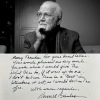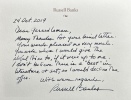Russell BANKS (1940-2023)
American writer of fiction and poetry
autograph signed card about 2019 Nobel Prize of literature
Russell BANKS (1940-2023) American writer of fiction and poetry Autograph card, signed by Russel Banks, 11 lines, printed name letterhead to French autograph collector Gérard Léman + autograph envelope postmarked 24 OCT 2019 with printed label : Russell Banks / 1026 Hurricane Road / Keene, New York 12942. 14x10.6 cm American writer of fiction and poetry, Russell Banks, member of the International Parliament of Writers and a member of the American Academy of Arts and Letters, thanks Gérard Léman, French autograph collector about his "kind letter" : "your words pleased me very much" and answer his question about 2019 Nobel Prize of Literature : "You ask whom I would give the Nobel Prize to, if it were up to me. I don't believe there is a "best" in literature or art, so I would decline the offer." The 2019 Nobel Prize in Literature was awarded to the Austrian writer Peter Handke (born 1942) "for an influential work that with linguistic ingenuity has explored the periphery and the specificity of human experience." The prize was announced by the Swedish Academy on 10 October 2019. Russell Earl Banks was born in Newton, Massachusetts, on March 28, 1940, and grew up "in relative poverty." He is the son of Florence, a homemaker, and Earl Banks, a plumber, and was raised in Barnstead, New Hampshire. His father deserted the family when Banks was aged 12. While he was awarded a scholarship to attend Colgate University, he dropped out six weeks into university and travelled south instead, with the "intention of joining Fidel Castro's insurgent army in Cuba, but wound up working in a department store in Lakeland, Florida". He married Darlene Bennett, who was working as a sales clerk at the time; they had one daughter and later divorced. According to an interview with The Independent, he started to write when he was living in Miami in the late-1950s, though an interview with The Paris Review dates this to Banks's subsequent spell living in Boston. He moved back to New England in 1964 and then to North Carolina, where he attended the University of North Carolina at Chapel Hill, funded by the family of his second wife, Mary Gunst. In Chapel Hill, Banks was involved in Students for a Democratic Society and protest during the Civil Rights Movement. In 1976, he was awarded a Guggenheim Fellowship. Banks divorced Mary Gunst in 1977 after 14 years of marriage. They had three daughters. He was subsequently married to Kathy Walton, an editor at Harper & Row, from 1982 to 1988. The following year, he married poet Chase Twichell. Banks was the 1985 recipient of the John Dos Passos Prize for fiction. Continental Drift and Cloudsplitter were finalists for the 1986 and 1999 Pulitzer Prize for Fiction respectively. Banks was elected a Fellow of the American Academy of Arts and Sciences in 1996. In popular culture, Banks was briefly mentioned in philosopher Richard Rorty's 1996 future history essay "Fraternity Reigns" in The New York Times Magazine as having written the fictional book Trampling the Vineyards, described as "samizdat", in 2021. Banks lived in upstate New York and Miami. He was a New York State Author for 2004–2006. He was also Artist-in-Residence at the University of Maryland. He taught creative writing at Princeton University. Banks died from cancer at his home in Saratoga Springs, New York, on January 7, 2023, at the age of 82. His work has been translated into twenty languages and has received numerous international prizes and awards. He wrote fiction, and, later, non-fiction, with Dreaming up America. His main works include the novels Continental Drift, Rule of the Bone, Cloudsplitter, The Sweet Hereafter, and Affliction. The latter two novels were each made into feature films in 1997 (see The Sweet Hereafter and Affliction). Many of Banks's works reflect his working-class upbringing. His stories often show people facing tragedy and downturns in everyday life, expressing sadness and self-doubt, but also showing resilience and strength in the face of their difficulties. Banks also wrote short stories, some of which appear in the collection The Angel on the Roof, as well as poetry. Banks also lived in Jamaica. Interviewed in 1998 for The Paris Review, he stated that : "After living in Jamaica and writing The Book of Jamaica, I accepted that I was obliged, for example, to have African-American friends. I was obliged to address, deliberately, the overlapping social and racial contexts of my life. I'm a white man in a white-dominated, racialized society, therefore, if I want to I can live my whole life in a racial fantasy. Most white Americans do just that. Because we can. In a color-defined society we are invited to think that white is not a color. We are invited to fantasize, and we act accordingly." The themes of Continental Drift (1985) include globalization and unrest in Haiti. His 2004 novel The Darling is largely set in Liberia and deals with the racial and political experience of the white American narrator. Writing in the Journal of American Studies, Anthony Hutchison argues that, "[a]side from William Faulkner it is difficult to think of a white twentieth-century American writer who has negotiated the issue of race in as sustained, unflinching and intelligent a fashion as Russell Banks". In 2023, it was confirmed that Paul Schrader would write and direct Oh, Canada, an adaptation of Banks' novel, Foregone, starring Richard Gere and Jacob Elordi. Beautiful piece of American Literature history.
Reference : DMI-1193
Bookseller's contact details
Librairie À la Demi-Lune
Monsieur Jonathan Devaux
06 22 83 47 26
Payment mode

Sale conditions
Conditions de vente conformes aux usages de la Librairie Ancienne et Moderne.
 Write to the booksellers
Write to the booksellers




